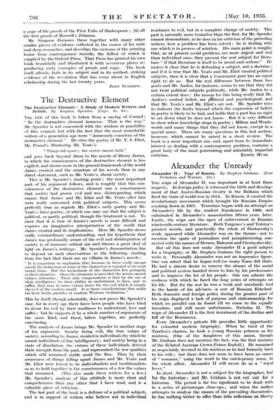The Destructive Element
The Destructive Element : A Study of Modern Writers and Beliefs. By Stephen Spender. (Cape. 8s. 6d.)
THE title of this book is taken from a saying of Conrad.: "In the destructive element immerse. That is the way."
Mr. Spender is not concerned with the wisdom or possibility of this counsel, but with the fact that the most remarkable writers of a generation ago were "immensely conscious of the destructive element." He cites the poetry of Mr. T. S. Eliot, Mr. Pound's 2Ifauberley, Mr. Yeats's "Things fall apart ; the centre oannot hold,"
and goes back beyond them to the novels of Henry James, in which the consciousness of the destructive element is leas explicit, and shown more in the general framework of the world James created and the structure of his novels than hi any direct statement, such as Mr. Yeats's, about society.
This is Mr. Spender's starting point ; the most important part of his argument follows, and is roughly that this con- sciousness of the destructive element was a consciousness that society had grown evil and was disintegrating, which means" that James and Mr. Eliot and Mr. Yeats after him were really concerned with political subjects. This seems perfectly true as regards Mr. Eliot's early poetry and Mr. Yeats's later poetry, of which one may say that the subject is political, or partly political, though the treatment is not. To show that it is true of James's novels is more difficult and requires an imaginative interpretation of the world that James created and its implications. Here Mr. Spender shows really extraordinary understanding, and his hypothesis that James was profoundly aware of the evil and disintegration of society is of immense critical use and throws a great deal of light on James's writings. Mr. Spender's demonstration has to depend on such observations as the following, starting from the fact that there are no villains in James's novels :
"It is important to emphasize this, because in these really savage novels the behaviour of some of the characters is exposed at its most brutal form. But the wickedness of the characters lies primarily in their situation. Once the situation is provided the actors cannot behave otherwise. Their only compensation is that by the use of their intelligence, by their ability to understand, to love, and to suffer, they may to some extent atone for the evil which is simply the evil of the modern world. It is these considerations that make his later books parables of modern Western civilization."
This by itself, though admirable, does not prove Mr. Spender's ease, for in every age there have been people who have tried to atone for evil by their readiness to understand, love and suffer ; but he supports it by a whole number of arguments of the same kind, and these, taken together, arc perfectly convincing.
The analysis of James brings Mr. Spender to another stage of his argument. Society being evil, the true values of society, according to James, resided in individuals (by which he meant individuals of fine intelligence) ; and society being in a state of dissolution, the virtues of these individuals derived their strength from the past, and represented the few qualities which still remained stable amid the flux. Thus by their awareness of things falling apart James and Mr. Yeats and Mr. Eliot were forced to be individualists and traditionalists so as to hold together in the consciousness of a few the values that remained. (This also made them writers for a few.) Mr. Spender's analysis of this attitude is more dear and comprehensive than any other that I have read, and is a valuable piece of criticism.
The last part of the book is a defence of a political subject, and is in support of writers who believe not in individual
resistance to evil, but in a complete change of society, This part is naturally more tentative than the first,-for Mr. Spender cannot demonstrate, as he does in his criticism of the preceding writers, how a problem has been solved : he is dealing with one which is in process of solution. His main point is roughly that, as at present social problems are more urgent and real than individual ones, they present the real subject for litera- ture "if that literature is itself to be moral and serious." He makes it clear that he is defending a subject, not a doctrine ; and if it is true that Mr. Yeats and Mr. Eliot treated political subjects, then it is clear that a Communist poet has an equal right to do so. But the real difference between these two poets and Mr. Auden, for instance, seems to me that they did not treat political subjects politically, while Mr. Auden to a certain extent does ; the reason for this being really that Mr. Auden's central beliefs are rillitical and psychological, and that Mr. Yeats's and Mr. Eliot's arc not. Mr. Spender tries to indicate the limits beyond which the expression of beliefs in poetry is likely to be bad, and holds that a poet has no right to set down what he does not know. But it is very difficult to show where knowledge stops in poetry ; Milton and Words- worth said many things that they did not know, except in a special sense. There are many questions in this last section, however, which cannot be raised in a short review. The book is a most important one, and, apart from its immediate interest as dealing with a contemporary problem, contains a great body of the most penetrating and admirably impartial


































































 Previous page
Previous page